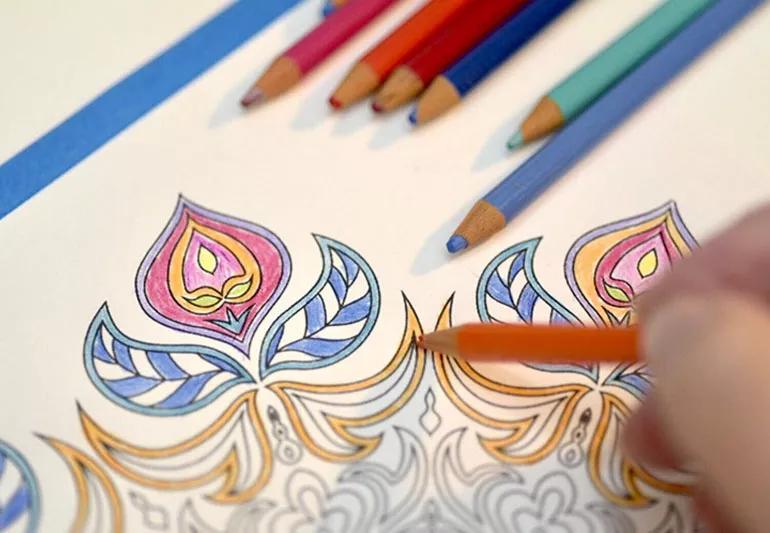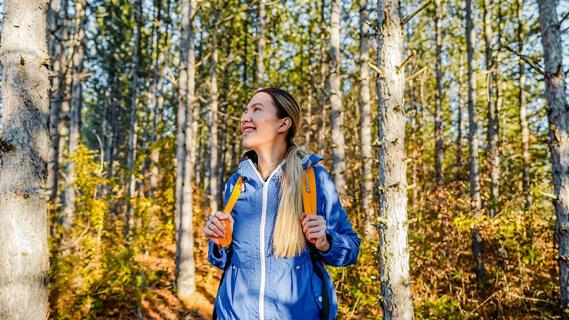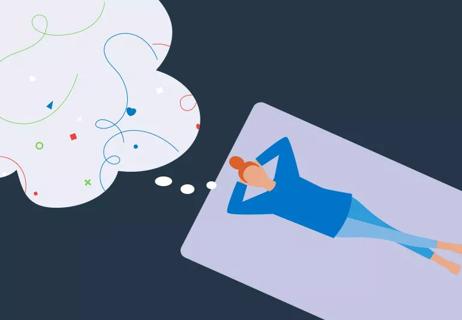Not just for children anymore

Adult coloring books have flooded shelves everywhere in the last few years. From grocery stores to your favorite online retailer, these books — with their empty patterns of mandalas, animals and floral designs — seem to be everywhere. But what makes them so popular?
Advertisement
Cleveland Clinic is a non-profit academic medical center. Advertising on our site helps support our mission. We do not endorse non-Cleveland Clinic products or services. Policy
Many books tout the benefits of coloring — a thing kiddos have known for ages. Coloring can help you channel your inner artist, de-stress and bring a sense of peace. But is there truly a benefit to coloring for adults? And what does this pastime do to our brains to bring about such pleasure and calm?
According to clinical psychologist Scott M. Bea, PsyD, it has everything to do with refocusing our attention.
“Adult coloring requires modest attention focused outside of self-awareness, Dr. Bea says. “It’s a simple activity that takes us outside ourselves in the same way, cutting the lawn, knitting or taking a Sunday drive can all be relaxing.”
Dr. Bea cites three reasons adult coloring can be calming:
Advertisement
Adult coloring doesn’t relax everyone. Whether or not you enjoy coloring depends a lot on your prior experiences. Dr. Bea suspects that if you enjoyed coloring as a child, you likely will enjoy it as an adult.
“Adults typically choose forms of activities they loved as children for their adult recreations,” he says.
Research on adult coloring specifically is limited, as it has risen in popularity relatively recently. However art therapy has been used for many years with much success.
In a 2006 study, researchers found that mindfulness art therapy for women with cancer helped to significantly decrease the symptoms of physical and emotional distress during their treatment. Art therapy has also been helpful to people coping with other conditions, including depression, anxiety, addictions and trauma.
In a more recent study, researchers evaluated the effectiveness of coloring a complex geometric design, like a mandala, on reducing anxiety with a group of undergraduate students. The results showed a decrease in anxiety levels for the students and suggested the practice created a sort of meditative state that is beneficial for reducing anxiety.
“While adult coloring may differ slightly from mindfulness art therapy, I suspect the adult coloring would yield similar results. It is likely that its therapeutic benefits would be similar to listening to a person’s favorite music,” Dr. Bea says.
Having hobbies to help de-stress is nothing new, whether people like to golf, cook, build model airplanes or put together scrap books.
But with the current state of daily life with COVID-19, and so many uncertainties looming in the distance, coloring might just be the ticket to help you unwind and re-center.
“We have a very stress-inducing culture, and I think individuals are always seeking new ways to reduce tension, restore feelings of well-being, and reduce the toll that our stressful lives take on our health,” Dr. Bea says.
Advertisement

Sign up for our Health Essentials emails for expert guidance on nutrition, fitness, sleep, skin care and more.
Learn more about our editorial process.
Advertisement

Breathing, exercise, mindfulness and more can help you unwind and step away from your stress

From breath meditation to yoga nidra, all types of meditation aim to help you feel calmer, more relaxed and present

Sensory deprivation therapy can help relieve stress, improve sleep and decrease physical pain

You don’t need to have years of experience to reap the rewards of meditation — with benefits for your whole body, you only need a couple minutes to get started

While walking, be mindful of your body, your mind, your place in the world and all five of your senses as you pave a path forward, one step at a time

Thunder, waterfalls and heavy rain — these low-frequency sounds might help cancel out disruptive noises and thoughts

Immersing yourself in nature can improve both your mental and physical health

This bedtime exercise can help you fall asleep faster (and stay asleep)

Even small moments of time outdoors can help reduce stress, boost mood and restore a sense of calm

A correct prescription helps your eyes see clearly — but as natural changes occur, you may need stronger or different eyeglasses

Both are medical emergencies, but they are very distinct events with different causes